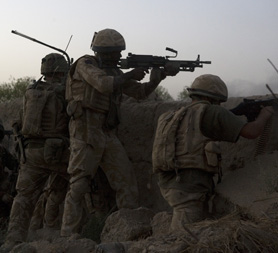Afghanistan: the fight against fear
For British troops in Afghanistan – and soldiers everywhere – the first battle to win is with themselves, writes Captain Doug Beattie in his latest blog from Helmand.

Captain Doug Beattie of 1 Royal Irish Regiment won the Military Cross for bravery in Afghanistan. He writes exclusively for Channel 4 News on his return to the frontline.
Fear. You won’t hear soldiers talk about it. Fear is a taboo subject, a word suggesting weakness or worse, what they once would have called a lack of moral fibre.
Troops skirt around it, deploying instead phrases like, “that was a close one” or “that wasn’t fun” to mask the reality of what they are feeling. But the question is not whether soldiers feel fear – for they do – but how they react to it.
It can be a powerful motivator, allowing you to do things you never thought you were capable of. But fear can also be mentally and physically debilitating, preventing men from carrying out the actions needed for survival.
If you look you will see fear everywhere. I have known fear, felt it, saw it in the eyes of my men and in the faces of my enemies. It strikes without warning, not just in the heat of combat but in the quiet reflective moments when there is too much time to think.
Fear
In the heart of Helmand there is much to be fearful of: the threat of death and injury, of having seen your family, your wife and children for the last time; of letting down your friends and colleagues, your regiment, your hometown.
I have felt physically sick before heading out on a routine patrol, almost debilitated with fear as I watch children and women flee an area we are entering, their dispersal always a prelude to attack. But as a commander I must stand tall, continue the mission, it is the loneliest of feelings, the loneliness of command.
When the bullets come there is no quick dash to safety, the mud rooting you to the spot. As the enemy engages, the cursing and high-pitched screaming of men starts.
In the middle of winter in Southern Nad-e-Ali with 1 Royal Irish the fighting and killing is done in the open, in mud-heavy fields freshly ploughed and irrigated. There is nowhere to hide, the irrigation ditches that could give cover have been seeded with IEDs (improvised explosive devices), the bare tree lines no longer providing cover from view or fire. The mud is everywhere, it clings to your boots like glue and sucks the soldiers’ legs into the saturated terrain.
It is a scene and experience that would not be alien to those who served in the Great War.
Work of war
When the bullets come there is no quick dash to safety, the mud rooting you to the spot. As the enemy engages, the cursing and high-pitched screaming of men starts. But very soon, the training and the adrenaline really do kick in and the job of war truly begins.
The shouts are workmanlike and purposeful, orders are given and information passed. Insurgent positions are identified and fire is returned. For most the fear has been elbowed aside, the controlled violence and frenetic activity offering an escape. However for some the fear is persistent…
Back home, the British public are buoyed by media stories of heroism, young men overcoming adversity, it is uplifting. And these stories are part of the picture. I witnessed such bravery on a daily basis in 2008 with 1 Royal Irish as I witness them today with the same regiment. Back then I wrote citations for two men under my command which resulted in one of them receiving the Military Cross the second the Conspicuous Gallantry Cross.
Inner battle
But where is the glory for the man who has overcome the most incapacitating fear? The one who has – against every instinct – uncurled himself from a foetal position and used his inner strength to haul himself up to face the enemy?
What recognition for the soldier who has lost a colleague in horrifying circumstances and yet the very next day will return to the scene despite uncontrollable vomiting and emotional confusion?
For many of the men and women in Helmand the biggest battles every day of every week for six months are with themselves. Only when those are won can they turn their attentions to the enemy.
For many of the men and women in Helmand the biggest battles every day of every week for six months are with themselves.
Even for me – a soldier of 28 years and on his third tour of Afghanistan – those battles are still to be won daily, each time harder than the last.
But they are never fought alone, they are fought with those who share your experiences – your friends, your colleagues, the men left and right of you when the bullets fly.
I screamed as the large calibre bullet flew past my face, too fast to see, too quick to dodge, the distinctive cracking noise known only to those who know battle.
I woke up in my camp cot in CP SABAT sweating. Even in sleep the fear is there.
Captain Doug Beattie MC of 1 Royal Irish Regiment is currently deployed in Southern Afghanistan. He is the author of An Ordinary Soldier and Task Force Helmand. Pictures provided by R IRISH media ops. View more here.